constituent assembly of india debates (proceedings)- volume vii
constituent assembly of india debates (proceedings)- volume vii
constituent assembly of india debates (proceedings)- volume vii
You also want an ePaper? Increase the reach of your titles
YUMPU automatically turns print PDFs into web optimized ePapers that Google loves.
een well described by Metcalfe himself who says:<br />
"Dynasty after dynasty tumbles down. Revolution succeeds to revolution. Hindoo, Pathan, Mogul, Maratha, Sikh, English are all masters<br />
in turn but the village communities remain the same. In times <strong>of</strong> trouble they arm and fortify themselves. A hostile army passes through<br />
the country. The village communities collect their little cattle within their walls, and let the enemy pass unprovoked."<br />
Such is the part the village communities have played in the history <strong>of</strong> their country. Knowing this,<br />
what pride can one feel in them? That they have survived through all viscisitudes may be a fact. But<br />
mere survival has no value. The question is on what plane they have survived. Surely on a low, on a<br />
selfish level. I hold that these village republics have been the ruination <strong>of</strong> India. I am therefore surprised<br />
that those who condemn Provincialism and communalism should come forward as champions <strong>of</strong> the<br />
village. What is the village but a sink <strong>of</strong> localism, a den <strong>of</strong> ignorance, narrow-mindedness and<br />
communalism? I am glad that the Draft Constitution has discarded the village and adopted the individual<br />
as its unit.<br />
The Draft Constitution is also criticised because <strong>of</strong> the safeguards it provides for minorities. In this,<br />
the Drafting Committee has no responsibility. It follows the decisions <strong>of</strong> the Constituent Assembly.<br />
Speaking for myself, I have no doubt that the Constituent Assembly has done wisely in providing such<br />
safeguards for minorities as it has done. In this country both the minorities and the majorities have<br />
followed a wrong path. It is wrong for the majority to deny the existence <strong>of</strong> minorities. It is equally<br />
wrong for the minorities to perpetuate themselves. A solution must be found which will serve a double<br />
purpose. It must recognize the existence <strong>of</strong> the minorities to start with. It must also be such that it will<br />
enable majorities and minorities to merge someday into one. The solution proposed by the Constituent<br />
Assembly is to be welcomed because it is a solution which serves this tw<strong>of</strong>old purpose. To diehards who<br />
have developed a kind <strong>of</strong> fanaticism against minority protection I would like to say two things. One is<br />
that minorities are an explosive force which, if it erupts, can blow up the whole fabric <strong>of</strong> the State. The<br />
history <strong>of</strong> Europe bears ample and appalling testimony to this fact. The other is that the minorities in<br />
India have agreed to place their existence in the hands <strong>of</strong> the majority. In the history <strong>of</strong> negotiations for<br />
preventing the partition <strong>of</strong> Ireland, Redmond said to Carson "ask for any safeguard you like for the<br />
Protestant minority but let us have a United Ireland. "Carson's reply was "Damn your safeguards, we<br />
don't want to be ruled by you." No minority in India has taken this stand. They have loyally accepted the<br />
rule <strong>of</strong> the majority which is basically a communal majority and not a political majority. It is for the<br />
majority to realize its duty not to discriminate against minorities. Whether the minorities will continue or<br />
will vanish must depend upon this habit <strong>of</strong> the majority. The moment the majority loses the habit <strong>of</strong><br />
discriminating against the minority, the minorities can have no ground to exist. They will vanish.<br />
The most criticized part <strong>of</strong> the Draft Constitution is that which relates to Fundamental Rights. It is<br />
said that Article 13 which defines fundamental rights is riddled with so many exceptions that the<br />
exceptions have eaten up the rights altogether. It is condemned as a kind <strong>of</strong> deception. In the opinion <strong>of</strong><br />
the critics fundamental rights are not fundamental rights unless they are also absolute rights. The critics<br />
rely on the Constitution <strong>of</strong> the United States and to the Bill <strong>of</strong> Rights embodied in the first ten<br />
Amendments to that Constitution in support <strong>of</strong> their contention. It is said that the fundamental rights in<br />
the American Bill <strong>of</strong> Rights are real because they are not subjected to limitations or exceptions.<br />
I am sorry to say that the whole <strong>of</strong> the criticism about fundamental rights is based upon a<br />
misconception. In the first place, the criticism in so far as it seeks to distinguish fundamental rights from<br />
non-fundamental rights is not sound. It is incorrect to say that fundamental rights are absolute while<br />
non-fundamental rights are not absolute. The real distinction between the two is that non-fundamental<br />
rights are created by agreement between parties while fundamental rights are the gift <strong>of</strong> the law.<br />
Because fundamental rights are the gift <strong>of</strong> the State it does not follow that the State cannot qualify<br />
them.


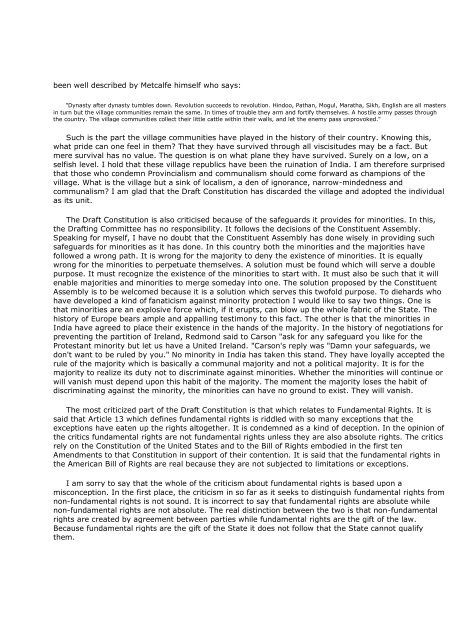
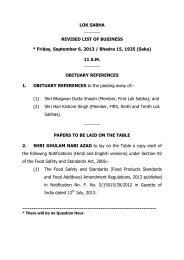
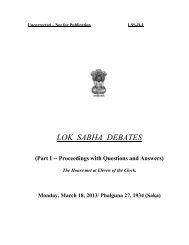
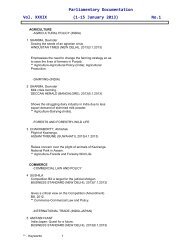
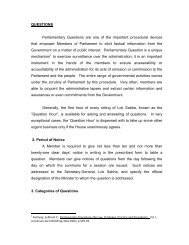
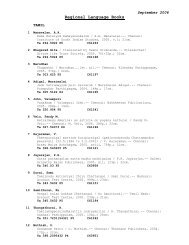
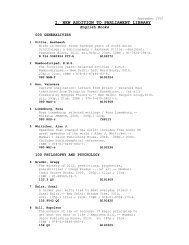
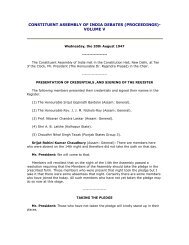
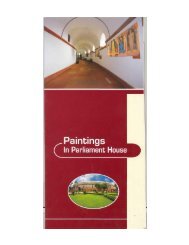
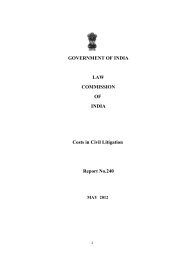
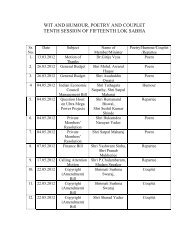
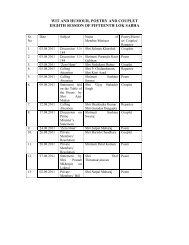

![gÉÉŌ A.]ÉŌ. xÉÉxÉÉ](https://img.yumpu.com/8015720/1/190x245/geeo-aeo-xeexee.jpg?quality=85)
